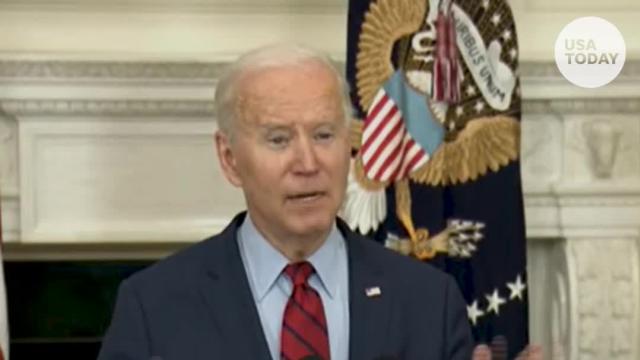'Shame, shame, shame': Schumer, McConnell clash in hearing on major voting rights bill
Savannah Behrmann
WASHINGTON – Senators clashed Wednesday over sweeping voting rights legislation that would set federal standards on early and mail-in voting, and expand access to the polls.
S1, or the For the People Act, is being examined in the Senate Rules and Administration Committee. The bill, one of the most expansive election reform measures introduced in Congress in decades, was lauded by Democrats and slammed by Republicans as being overreaching.
More: The House passed a sweeping voting rights act. What's in it?
The bill recently passed the House 220-210, with one Democrat joining all voting Republicans to oppose the bill. Two Republicans did not vote.
Senate Rules Chair Amy Klobuchar, D-Minn., said Wednesday the legislation aims to make "voting easier, getting big money out of politics and strengthening ethics rules."
"These are not radical proposals. These are ideas that nearly everyone in this country agrees with. And this bill, we can make them a reality," Klobuchar said.
But Sen. Roy Blunt, R-Mo., the top Republican on the committee, said the legislation would be a "federal takeover of the election process" and "that would be an unmitigated disaster for our democracy."
More: Michelle Obama, Jennifer Lopez, Billie Eilish demand Congress pass voting rights bill
Among other things, the legislation seeks to increase voter turnout by expanding early voting, lessening identification requirements, allowing same-day registration and requiring states to set up automatic registration for federal elections for eligible voters.
Video: President Biden urges Congress to pass gun safety measures
It would also lessen the influence of gerrymandering and require states to establish a bipartisan independent commission to redraw their congressional districts every 10 years.
Senate Majority Leader Chuck Schumer, D-N.Y., spoke at the hearing, and said Republicans are trying to "disenfranchise" voters following losses during the 2020 election.
"Shame on them," Schumer said. He queried, "I would like to ask my Republican colleagues: why are you so afraid of democracy? Why, instead of trying to win voters over that you lost in the last election, are you trying to prevent them from voting?"
"Shame, shame, shame. This is not the usual political argument. This goes to the core of our democracy," he continued.
Push for its passage from Democrats and advocates comes in the wake of many states adopting mostly Republican-sponsored election measures.
More than 253 bills in 43 states have been introduced that would restrict access to voting, including reducing early voting hours, according to the Brennan Center for Justice at New York University's School of Law in New York City.
Opponents of those laws say they limit voter registration, early voting days, mail balloting and other provisions that disproportionately affect young voters, low-income voters and people of color, groups that historically tend to vote for Democrats. Republicans argue the efforts, particularly at the state level where elections are run, are to protect against fraud and make sure only eligible voters can cast ballots.
Sen. Jeff Merkley, D-Ore., one of the co-sponsors of the bill, said, “We see the long lines in very poor communities. We see difficult places to reach or moved precinct polling places in areas that are primarily where Black Americans vote.”
Merkley said people should be able to vote “Without being sent to someplace that has no parking, without being sent to someplace where there is no staff so they have to wait in line for five hours, without worrying about whether that November election is in the middle of a snowstorm. They want to exercise that right and we have a responsibility to defend their ability to do so.”
The showdown comes in the wake of unfounded allegations by former President Donald Trump and many congressional Republicans that the presidential election, which Trump lost by 7 million votes, was rigged. There is no evidence to back up these claims after months of debate that saw Republican-appointed judges and election officials defend the integrity of the 2020 election. Trump supporters stormed the U.S. Capitol on Jan. 6 while Congress counted electoral votes of President Joe Biden's win, leaving five people dead. Trump was impeached a second time on a charge he incited the riot, but he was acquitted in the Senate.
Senate Minority Leader Mitch McConnell, R-Ky., said during the hearing that both sides of the political aisle have had problems accepting election results in the past — Democrats in 2016 and Republicans in 2020.
Opinion from Sen. Mike Lee: H.R. 1 is not 'For the People'
More: What's next in Iowa's contested 2nd District race? Campaigns must argue their cases in new filings
But he accused Democrats of continuing a "partisan power grab" and going against "everything" they have been "preaching" by supporting Democrat Rita Hart, who is challenging a race she lost to GOP Rep. Marinette Miller-Meeks by about six votes.
"That's what happens, I would say to my Democratic friends, that's what happens when you let partisan bodies regulate elections," McConnell said.
He continued: "We can't afford to go further down this road. We should be finding ways to rebuild trust, not destroy it further. But that's exactly what a partisan power grab would guarantee. And that's what S1 is all about."
Contributing: Deborah Barfield Berry


